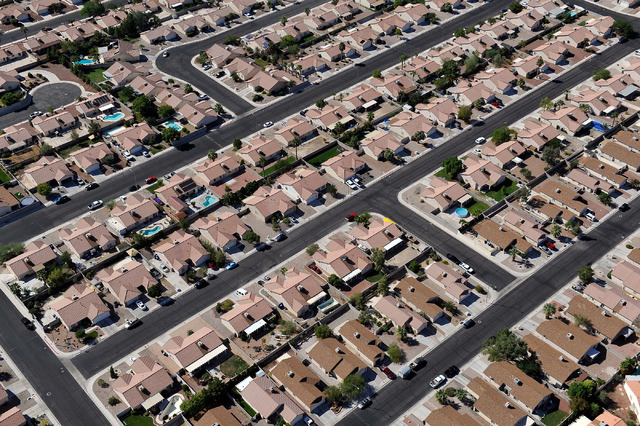Investor activity in home market drops in fourth quarter, firm says
Investors retreated in droves from Nevada’s housing market in the fourth quarter, a real estate research firm reported Thursday.
Nevada’s share of cash purchases in which no loan is recorded at the time of sale dipped to 42.5 percent year over year in the period from October through December, California-based RealtyTrac said.
That was down from 48.5 percent in the fourth quarter of 2013, and well below a peak of 63.8 percent in the second quarter of 2013.
The share of institutional investors — nonlending entities that bought at least 10 properties in the last year — tumbled to 3.6 percent of the market. That was about a quarter of the segment’s 12.7 percent share a year earlier.
Nationally, cash sales comprised 30.3 percent of all closings, while institutional investors were 3.7 percent of all buyers.
RealtyTrac Vice President Daren Blomquist said two factors caused Nevada’s investor slump.
First, the market has seen fewer of the distressed properties that attract investors. Nevada’s foreclosure auction sales in particular are down, falling more than 50 percent year over year in January.
Statistics from the Greater Las Vegas Association of Realtors also support the idea that investors have fewer distressed sales from which to choose. In January, for example, 9.7 percent of local sales were short sales, in which the lender let the borrower sell for less than what was owed on the mortgage. That was down from 17 percent in January 2014. Bank-owned closings made up 9.4 percent of the market, down from 11 percent a year earlier.
The stumble in institutional investors in particular “was quite extreme,” Blomquist said.
“It really stands out. But it makes a little more sense given the volatility we’ve seen in foreclosure numbers in Nevada and Las Vegas. Foreclosures aren’t the only source of homes for investors, but they’re a prime source. Those numbers have been wildly up and down in past years as the state has changed its foreclosure process and lenders have continued to adjust to that.”
On top of fewer distressed sales, prices have spiked, Blomquist said. That means institutional investors can no longer find as many properties at the bargain rates that mean healthy returns.
RealtyTrac showed a median price in Las Vegas of $165,500, up 55 percent from a February 2012 low of $106,500. Investors typically look for homes priced at less than $150,000 that they can turn around for a relatively quick profit, Blomquist said.
Investor flight, especially if it’s price-based, could be both bad and good for Southern Nevada.
For starters, it could mean fewer buyers for the thousands of distressed properties that may yet hit the market. It’s not clear that mortgage-backed owner-occupiers are ready to step in en masse and replace investors, Blomquist said.
“One question is whether the market has gone up so quickly that the traditional buyer has been priced out of it already,” he said. “The other big wild card is whether we have seen such a paradigm shift in attitudes toward homeownership that we’re never going to see the traditional buyer come back to the degree they were in the market before this past housing crisis.”
Still, any report that shows investment sales abating is an important sign of recovery.
“For a more sustainable and less speculative market, that’s the direction you want to see it go,” Blomquist said.
For what would qualify as sustainable, consider cash sales from 2001 to 2003, well before the housing bubble. They made up 23.9 percent of the Las Vegas market back then, RealtyTrac’s numbers show.
It’ll probably be a while before the number sinks that low again. Investors aren’t permanently abandoning Nevada’s housing markets, Blomquist said. He added that investor sales as a share of closings will likely bounce around in coming months, as Las Vegas in particular still has a backlog of distressed properties that may come on the market in “waves.”
Also, Las Vegas had two of the ZIP codes with the highest number of cash sales nationwide, Blomquist said. The northeast’s 89115 ranked No. 1, and 89128 in the northwest ranked No. 3.
“I do think Las Vegas is still appealing to investors,” he said.
Contact Jennifer Robison at jrobison@reviewjournal.com. Find her on Twitter: @J_Robison1.






















